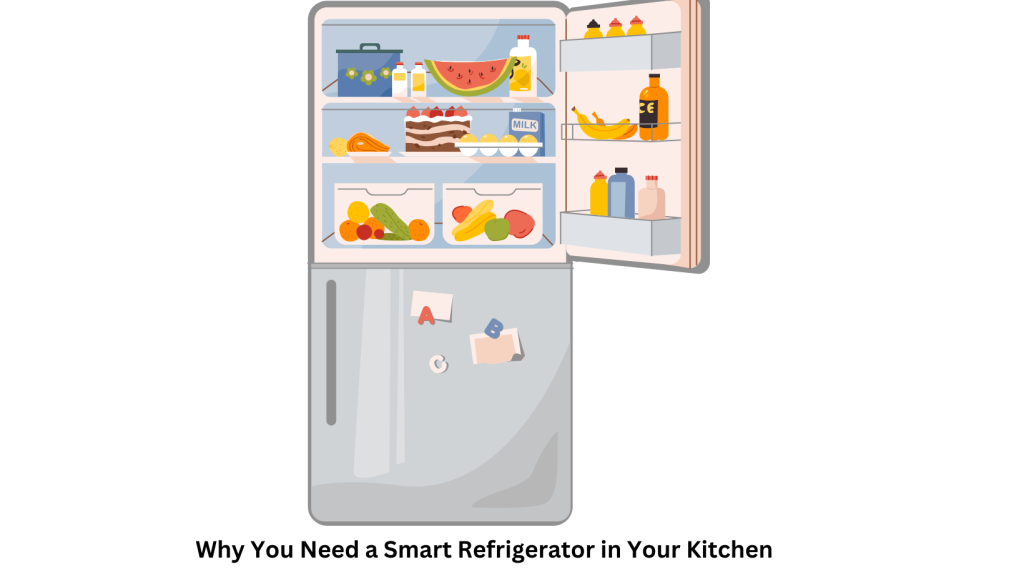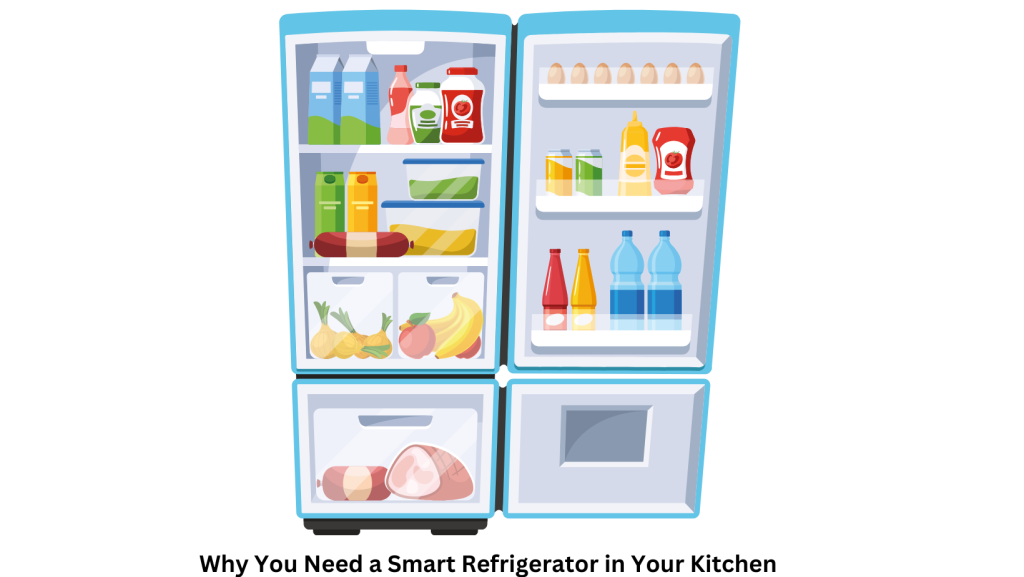Have you ever opened your refrigerator, only to realize you forgot to restock milk or let leftovers expire? In today’s fast-paced world, managing a kitchen can feel like a juggling act, especially when it comes to keeping your food fresh and your home running efficiently.
For many, traditional refrigerators simply can’t keep up with the demands of modern life. They store your food, but that’s where their job ends. Meanwhile, food waste piles up, grocery lists are forgotten, and energy bills creep higher. It’s a frustrating cycle.
That’s where smart refrigerators step in to change the game. These high-tech appliances are designed to do more than just keep things cold. They help you organize your kitchen, reduce waste, and even make your daily routine smoother. By the time you’re done reading, you’ll discover exactly how a smart refrigerator can revolutionize your kitchen and simplify your life.
What Exactly Is a Smart Refrigerator?
Imagine a refrigerator that does more than just keep your food fresh. A smart refrigerator is a modern kitchen appliance equipped with advanced technology. It connects to your home Wi-Fi and offers features that make managing your kitchen easier and more efficient.
Some smart refrigerators have touchscreens on the door. Others let you control settings through a smartphone app. Many come with voice assistants like Alexa or Google Assistant, so you can ask it to add items to your grocery list or check what’s inside without opening the door.
The main difference between a smart refrigerator and a traditional one is its intelligence. A traditional fridge cools and stores your food. That’s it. A smart refrigerator goes further. It can remind you when food is about to expire, suggest recipes based on what’s inside, or send you a notification if the door is left open.

Why Do Smart Refrigerators Exist?
A smart refrigerator isn’t just a fancy gadget for tech lovers. It’s built to make life easier and your kitchen more efficient. Its primary purpose is convenience. With features like inventory tracking, it helps you keep tabs on what’s inside without opening the door. Imagine knowing what you need for dinner just by checking your phone.
Another key purpose is better food management. A smart fridge can remind you when groceries are about to expire or suggest recipes based on what’s left. This means less wasted food and fewer forgotten items pushed to the back of the shelves.
Energy efficiency is another major benefit. Smart refrigerators use advanced controls to optimize energy use, helping you save money on electricity. Some models even adjust their cooling levels automatically based on how full they are.
Finally, smart refrigerators work seamlessly with smart home ecosystems. They connect with other devices, like smart speakers and thermostats. You can even sync them with your grocery delivery apps. These integrations simplify daily tasks and make managing your home feel effortless.
What Can a Smart Refrigerator Do for You?
A smart refrigerator isn’t just about keeping your food cold. It brings practical benefits that make your daily life easier and more efficient.
One major benefit is reducing food waste. Smart refrigerators have features like expiry reminders. For example, if your yogurt is about to go bad, the fridge can send you a notification. This helps you use ingredients before they spoil and saves you money.
Another big advantage is convenience. Many smart fridges let you create grocery lists right on the screen or through a connected app. Some even have voice assistants that let you add items while cooking. Imagine saying, “Add eggs to my grocery list,” without stopping what you’re doing.
Energy efficiency is another plus. These refrigerators are designed to use less electricity by adjusting cooling based on what’s inside. Over time, this can lower your energy bills.
Smart fridges also make multitasking a breeze. Some models let you stream music, display recipes, or even show the weather while you cook. Picture yourself following a step-by-step recipe right on your fridge screen or enjoying your favorite playlist while prepping dinner.
For example, Sarah, a busy mom, uses her smart refrigerator to plan meals for the week. The fridge suggests recipes based on what she has and helps her avoid overbuying groceries. This saves her time and keeps her kitchen running smoothly.

How to Make a Smart Refrigerator Work in Your Kitchen
A small kitchen doesn’t mean you have to sacrifice function or style. With a bit of planning, even compact spaces can accommodate a smart refrigerator perfectly.
Where Should You Put the Refrigerator in a Small Kitchen?
In a small kitchen, placement is everything. Choose a spot where the fridge won’t block walkways or cabinet doors. Placing it at the end of a counter or against a corner wall can maximize space. If possible, make sure it’s near the sink or stove to create a practical work triangle.
Smart refrigerators often come with space-saving features. For example, some models have doors that open in narrower arcs, making them ideal for tight spaces. Others have built-in storage solutions, like adjustable shelves or door bins, to help you fit more without feeling cramped.
What Size Refrigerator Works Best for Small Kitchens?
When space is limited, size matters. Counter-depth refrigerators are a great choice because they sit flush with your countertops, creating a streamlined look. Most counter-depth models are around 24 to 28 inches deep, which saves floor space without sacrificing storage.
Compact or modular smart refrigerators are another option. These models are designed for small spaces and often include flexible compartments. You can even combine two smaller units if you need more room later.
For example, if you live in a studio apartment, a slim 18 to 20 cubic foot smart fridge can fit perfectly while still offering advanced features. With careful measurements and the right model, you can enjoy all the benefits of a smart refrigerator, even in a cozy kitchen.
How to Maintain and Customize Your Smart Refrigerator
Proper maintenance keeps your smart refrigerator running smoothly, and choosing the right accessories, like water filters, ensures it works efficiently.
Which Water Filter Do You Need for Your Samsung Refrigerator?
Samsung refrigerators use different water filter models depending on the model you own. One of the most common filters is the Samsung HAF-CIN or HAF-QIN. These filters remove impurities like chlorine, rust, and heavy metals, giving you clean and fresh-tasting water.
To find the right filter, check the model number inside your fridge or in your user manual. Most Samsung refrigerators have a label near the water filter housing to guide you. Replacing the filter is easy. Twist out the old filter, insert the new one, and turn it until it locks in place. Samsung recommends replacing the filter every six months for the best results.
What Water Filter Do You Need for Your KitchenAid Refrigerator?
KitchenAid refrigerators also use specific water filters based on the model. The most common ones include the KitchenAid EveryDrop filters, such as Filter 1, Filter 2, or Filter 4. These filters remove contaminants like lead and pesticides while maintaining water quality.
To choose the right filter, look for the part number in your refrigerator’s manual or near the filter area. Most KitchenAid models have push-button filters, making replacement quick and simple. Just push the old filter to eject it, insert the new one, and ensure it clicks into place. Like Samsung, KitchenAid recommends changing the filter every six months or after filtering 200 gallons of water.
What’s Next for Smart Refrigerators?
Smart refrigerators are already changing how we manage our kitchens, but the future promises even more exciting advancements.
One major area of growth is artificial intelligence (AI). Future refrigerators may use AI to predict your grocery needs. For example, they could learn your shopping habits and automatically suggest what to buy. Some might even order groceries for you when supplies run low.
Machine learning will also play a big role. Over time, your refrigerator could get smarter by analyzing your preferences. It might suggest recipes based on the items you use most or adjust cooling settings to match your lifestyle.
Sustainability is another key trend. Smart refrigerators are expected to become even more energy-efficient. They may use advanced sensors to monitor energy use and adjust cooling based on the time of day or how often the doors are opened. Some models might even connect to solar panels to reduce your carbon footprint.
Imagine a refrigerator that scans your groceries when you put them in. It could track expiration dates and suggest meal plans to prevent waste. Or, think about a fridge that connects to local farmers’ markets to help you buy fresh, seasonal produce. These ideas might sound futuristic, but they’re closer than you think.
Why a Smart Refrigerator Might Be Worth It
A smart refrigerator is more than just a kitchen upgrade—it’s a step toward making your life easier and your home more efficient. With features that reduce food waste, save energy, and streamline your daily tasks, it’s clear that these appliances offer more than convenience. They help you stay organized, save money, and even contribute to a greener lifestyle.
But whether a smart refrigerator is right for you depends on your needs. Think about your kitchen size, your cooking habits, and the features that matter most to you. If you’re looking for ways to simplify meal planning, reduce clutter, or embrace the latest technology, a smart refrigerator might be the perfect fit.
Take some time to explore the options available. From compact models for small kitchens to feature-packed designs for busy families, there’s something for everyone. Investing in a smart refrigerator isn’t just about buying a new appliance—it’s about transforming your kitchen into a space that works smarter for you.

I’m a writer and culinary expert with over 10 years of experience in the kitchen. As a graduate of the Institute of Culinary Education and a passionate home chef, I created KitchenBreez.com to share my knowledge of kitchen techniques, cooking tips, and the best kitchen gadgets. Whether you’re a seasoned cook or just starting, my goal is to help you make your time in the kitchen more efficient and enjoyable.
